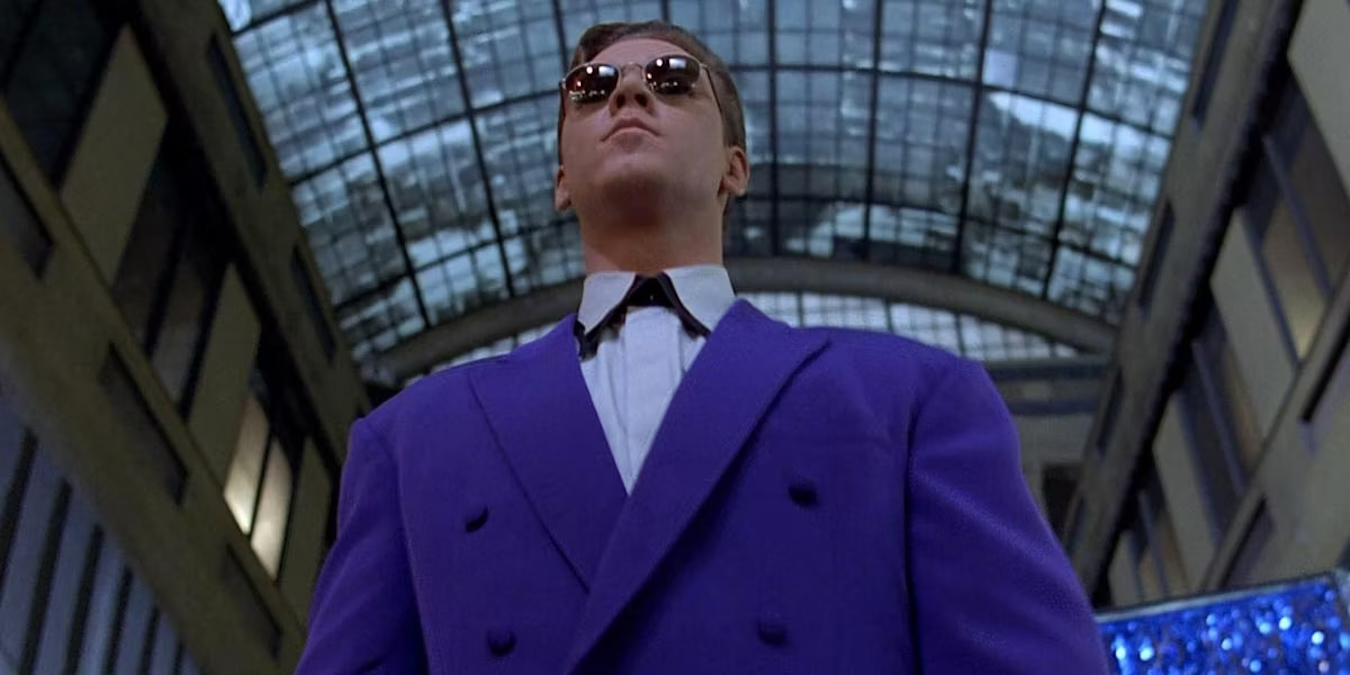
Russell Crowe, Academy Award-winning actor and all-around Generally Very Aussie Guy, has never turned in a bad performance. Some of his best films are benchmarks for who we are in modern pop culture, from his relentless turn as Maximus in Gladiator to his tactical and charming Captain Jack Aubrey in Master and Commander. The rest, well, they’re somebody’s favorite, anyway. And then, there’s his early ride to Hollywood as SID 6.7 in 1995’s Virtuosity, a brain-dead summer sci-fi flick that even Denzel Washington cannot help but sleepwalk through.
The premise is classic ‘90s cheese on toast points: With appropriate magical science, AI will become real and hurt us, and it will take One Cool Cop to save us from technology’s predations. At that time, I think roughly two people on Earth genuinely liked this movie. Me and Roger Ebert. Ebert liked it for trying to do new things in familiar action movie territory. I liked it because I was a dork that thrived on even the shittiest attempts to predict our future.
In 2024, Virtuosity is still a very bad movie that I love very much. But today I am vindicated by not only how great an actor Crowe remains, but also something this ridiculous movie predicted accurately, yet oh-so-accidentally: ChatGPT and other fad “AIs” that feed on human-guided machine learning programs. They’re the ultimate expression of “Garbage In, Garbage Out.” Virtuosity just adds the absurd idea that key to this process is the power of Australian charisma.
Counting Crowe
Sam Raimi’s The Quick and the Dead was technically Crowe’s earliest introduction to American audiences, arriving several months before Virtuosity’s release. That Western also still acts as a metaphor for Crowe’s career since he shines so brightly in a movie that went underrated for years. Generic sci-fi programmer Virtuosity doesn’t have the same cult vivacity as one of the best Westerns you’ve probably never seen. Nonetheless, 1995 was Crowe’s year to be an uncut diamond in the American rough.
By contrast, Denzel Washington is ever functional, and sometimes even engaging and funny, as Virtuosity’s hero. And it’s his smart theatrical sense during the making of the movie that caused it to cut what could have been a stultifying romantic subplot between his tarnished cop Barnes and the pretty blonde psychologist Dr. Carter (Kelly Lynch, who characterizes the lost plot more favorably). Even so, Washington is still stuck here with a generic Redeemable Hero Cop yarn. It’s a pedestrian setup that gives a good villain a chance to steal the show.
On paper, the AI called SID 6.7 shouldn’t be a good villain. He’s flat and suffers from generic dialogue and the usual violent snarls and swear words. But put Russell Crowe in a stolen purple zoot suit (‘90s fashion was something the fuck else, kids) and suddenly there’s enough magic happening to keep your eyes on him. Just like SID wants.
Two showpieces remain in the viewer’s memory, too, long after the rest of the film fades. The first is a twist on the obligatory prison escape. In this sequence, SID’s made it into the real world as a flesh-and-blood human, courtesy of his creator, and he’s figuring out how to apply his favorite hobby (slaughter) to something other than polygons.
Hence in a nightclub sequence, Sid puts together a synthesized orchestra of terror. (Seriously, if you pull up just one scene on YouTube, make it this one!) Crowe channels the sort of over-the-top wicked cultured villainy rarely found outside of a Vincent Price performance. It’s also where he gets that natty suit. Like an addict, the attention-craving SID barely can barely get a hit off the nightclub, so he goes scrounging for a bigger, better captive audience.
A TV commercial thus takes him to the big UFC-like fight happening downtown, and now he really understands what he’s been craving. You can feel the words “Are you not entertained?!” already resonating inside this guy. Anyway, once he’s inside the arena, SID steals the limelight from an audience hottie by forcing himself into the camera shot. As Barnes arrives, SID manages to still look threatening while burdened by some of the worst special effects of the era, flinging himself down into the arena with gleeful, idiotic flair.
Stuck with a Hulk Smash kiddie glove painted blue and snarling so madly he’s heard over the crowd as he escapes, it’s as if Wile E. Coyote stopped giving a shit and gave himself over to the bloodlust. Is it good? No. Is it fantastically watchable? Oh my God, yes.
SID 6.7, The Ultimate Tech Bro Project in a Post-ChatGPT World
The catalytic force behind SID’s rampage in meatspace is born from basic human flaws. SID’s creator, Dr. Lindenmeyer (Stephen Spinella), is some grown-up 4chan weirdo who has trained two intensely detailed AI constructs from genesis to “adulthood.” One is a perfectly shaped white female nymphomaniac named Sheila, who I assume was fed a steady diet of Ted Cruz’s alleged porn video favorites, and the other is a psychopath nursed on almost nothing but serial killers. SID (a hilarious acronym for Sadistic, Intelligent, and Dangerous) is intelligent and well-mannered when he’s not screaming for attention, borrowing heavily from our fictional assumptions about killers and not much of the reality.
But reality is just too real for the sort of guy that beelines straight to porn and murder for a breakthrough technology that could change the world, and Spinella puts every ounce of unsettling homoeroticism he can into his portrayal of a corrupted scientist rooting way too hard for his baddest boy. And when murderous little angel SID pushes Lindenmeyer toward a plan that could incarnate him into the real world via magical nanotech, the sexbot goes instantly forgotten, save as a gambit to snare another scientist. The real prize for Lindenmeyer is the chance to live vicariously through the worst humanity has to offer, lovingly designed by his own hands.
While I won’t cast aspersions on the makers of OpenAI, or Twitter’s saddest loser (I lie, I’ll asperse on the alleged I’ll Buy You A Horse Guy 24 hours a day), it’s still a bitter laugh to compare Lindenmeyer’s blinding bias toward his murderbaby to ChatGPT’s nigh-instant piledrive into racist outputs. Articles from this year follow up orn GPT and Gemini outputs that assume, from AAVE-tinted inputs, that it’s just dandy to load its responses with racist implications of lowered intelligence and laziness. AI models used in legal hypotheticals were even quick to apply the death penalty in situations where the defendant could be labeled by the AI as Black.
It’s a problem that was identified and discussed as early as 2020 when today’s big star was still the baby GPT-3. Yet it’s a problem unconquered—probably because when the final arbiter of a program’s input is a human being, it’s hard to dig out all of the implicit bias that comes with that. It doesn’t even seem like the developers want to, when even casual interviews bring out Borg-like dialogues about futility, and offer vague assurances of respect to artists that are still having their art stolen to train output barfers like DALL-E.
Lindenmeyer is barely explored in Virtuosity, but he doesn’t need to be. His secret lusts are plain in SID’s design. SID is vile, alluring, possessed of a fine tight butt, and clearly down to fuck whoever, so long as he can kill them afterward. What lusts are plain in modern AI outputs? Information control, bias amplification, and a brain-dead audience that hungers for more. Virtuosity, arguably, sucks, but reality is sucking more. And we can’t say we weren’t warned.
Crowe-nenbergian Results
With the help of a young Crowe already hip-deep in an acting style I can only describe as “this job will get done, I will have fun doing it, and beyond that, I don’t give a fuck,” Virtuosity, a basic bad movie, is transformed into a great midnight-and-munchies flick. In one of those little media miracles, it even manages to comment on a future it could barely imagine.
It’s too much to say the film is a Videodrome for the ‘90s, because, respectfully, I’m not sure Virtuosity director Brett Leonard knows who Marshall McLuhan is and why that matters. Yet the way Cronenberg interpreted a future of new mediums and messages has an unstable parallel in Virtuosity’s silly slap fight over a glorified chatbot output. Considering that literally everything he does is derivative of the inputs he was fed, we can’t even be sure SID was “true” AI—and, certainly, today’s generative AIs are no different. They are what we make them, and we are flawed.
Virtuosity is an accident of cinema made watchable by Crowe’s irrepressible charisma thrown against Washington’s stoic straight man act. It’s inarguably one of the worst films of either man’s career, of which, let me add The Pope’s Exorcist is not. Tell me I’m a fool for loving both that and Virtuosity, and I will manifest a hundred stink bugs in your home. For futurist wonks and silly action fans, Virtuosity remains worth a watch. For anyone that wants one of the greatest male butt shots in cinema, well, you’ve got a place here too.
The post Virtuosity Is Russell Crowe’s Best Bad Movie, and It Predicted ChatGPT appeared first on Den of Geek.











